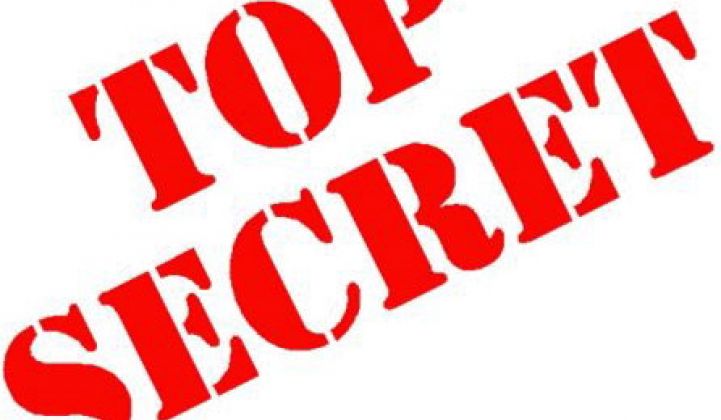Guy Kawasaki has a rule of thumb: "The more a company believes they must be secretive, the less they have."
Eric Ries says, “If a startup can’t innovate faster than a much larger competitor, stealth isn’t going to make the difference -- they’re toast."
Vivek Wadha has this to say on his blog at Techcrunch: "Stealth startups, get over yourselves -- nobody cares about your secrets."
There's certainly a role for secrecy in the innovator and startup world. But at a certain point, is there any value to concealing your idea? And in expending so much energy to keep it under wraps?
Here is a partial list of startups currently in, or recently emerged from stealth:
Bloom Energy was in stealth for years until an epic unveiling of its world-shattering product: wait for it -- expensive fuel cells. Despite the spin applied by the Kleiner Perkins hype machine, this product was still decades-old technology powered by natural gas. That leaves Bloom, a now long-in-the-tooth startup, relying on Advanced Equities to continue funding a money-losing business while searching for incentive-laden regions. Did stealth help?
EEstor, another Kleiner Perkins-seeded firm, remains in stealth a decade in and has yet to produce a commercial product other than a cottage-industry of conspiratorial-minded bloggers.
Senergen, a VantagePoint Venture Capital-funded solar firm, never made it out of stealth before it went out of business. Perhaps not being in stealth would have been the right strategic move.
Powergetics, a stealth, behind-the-meter energy storage firm, recently won $10.2 million in VC funding.
Xtreme Power is an energy storage firm which reveals very little about its battery technology -- presumed to be advanced lead-acid. Here's how the Hawaii Free Press reacted to Xtreme and its stealthy tendencies.
ArrayPower, a solar electronics firm, just came out of stealth, and Solexel, a Kleiner-backed solar module maker, still keeps its technology under wraps. As does Amprius, a battery firm, and, to a lesser extent, Alta Devices, a galium arsenide (GaAs) solar firm.
Another stealth firm, Nest Labs, is creating a "[C]limate control system consisting of a digital thermostat that automatically sets climate conditions based on prior and historical patterns of climate settings selected by users; climate control system consisting of a digital thermostat that can be controlled wirelessly from a remote location; software application for use on computers and hand-held devices to control climate and energy usage in homes and businesses from a remote location." (This information comes from now-removed trademark filings.)
It sounds a lot like EcoFactor, a company we've covered on numerous occasions.
Rumors have Nest funded with $50 million to $80 million in venture capital from Kleiner Perkins and other VCs, along with a "very high" valuation.
Kawasaki adds: "What’s going on in the entrepreneur’s brain? 'My idea is so astounding that if people just hear it, they will drop everything and implement it.' Bottom line: if merely hearing about your idea renders it defenseless, you don’t have a defensible idea."
Greentech Media will continue to keep our eye on these stealth firms in the long run, exploring whether stealth was a sound route to market.



